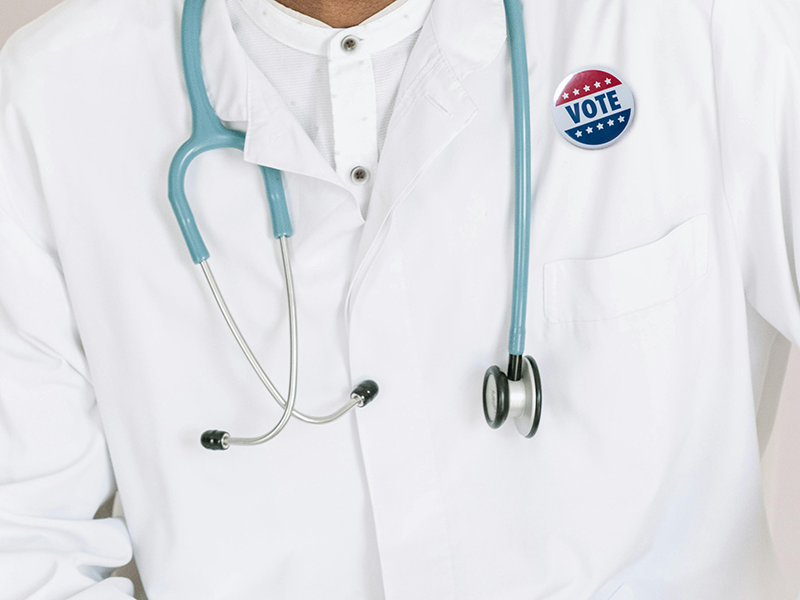Like everywhere else in the world, when the COVID-19 crisis struck Ireland, its medical community responded with a resounding call to arms.
Yet much unlike every other nation combating the pandemic, since March, it has had its prime minister working one day every week within its medical system.
A graduate from the School of Medicine at Dublin’s famed Trinity College, Leo Varadkar qualified as a GP in 2010 and has been conducting phone assessments of possible COVID-19 patients along with his busy job running the country.
Varadaker’s trajectory from high profile politician to frontline medical worker might be exceedingly rare, and is certainly one whose catalyst was a global health emergency. Yet the career step from medicine to politics is far more common than you might initially suspect.
The attributes of a successful doctor pair well with those needed to be a politician. Both roles require superb time management skills, the ability to think clearly, rationally and quickly under pressure, and the need to collaborate and work well in a team.
“When you’re a Type A surgeon, as I am, one thing leads to another,” former Rep. Tom Price (R-Georgia) told the New York Times in 2014. “The next thing you know, somebody is asking you to run for office.”
Trust, from the public, is a whole other thing, however. A doctor who once trained Varadkar told the Guardian that he recalled the young med student telling him that, as a doctor, people believed everything you said, but, as a politician, nobody believed a word.
Varadkar, who assumed office in 2017, is joined by President Bashar al-Assad of Syria as current heads of state who came from the medical field. A murderous autocrat, al-Assad trained as an ophthalmologist in London.
Mahathir Mohamad, who recently resigned as the Malaysian prime minister after a controversial 24 combined years in charge, once served as a physician in Singapore.
Former presidents of Chile (Michelle Bachelet), Brazil (Juscelino Kubitschek), and Malawi (Hastings Banda) were doctors, while physicians regularly pop up amongst the ranks of cabinet ministers across the world.
Arguably the most famous former doctor to gain power in the world of politics is Argentine Che Guevara. The iconic revolutionary leader focused on leprosy during his studies, before qualifying as a physician in 1953, specializing in dermatology.
Having left his residency early, Guevara, who was killed in 1967, never practiced, but reportedly once said that witnessing suffering in the countries he traveled to inspired him to enter the world of revolutionary politics.
“I began to look into what I needed to be, a revolutionary doctor,” he said, according to MD Mag.
In the United States, medical practitioners have been involved in American politics since the birth of the Republic. Four doctors signed the Declaration of Independence in 1776, including Dr. Benjamin Rush, an early teacher at the first American medical school in Philadelphia.
"I think the physician has as much place in politics as anyone else."
— John Kitzhaber
In more recent years, Senator Bill Frist (R-Tennessee) was a well-known heart and lung transplant specialist before later becoming the Senate Majority Leader, while Howard Dean, a long-serving Democratic Governor of Vermont who ran for President in 2004, used to run a family medical practice.
Rep. Price, a former orthopedic surgeon, briefly served as the Secretary of Health and Human Services in 2017, before resigning after a travel costs scandal. Ronny Jackson, President Donald Trump’s former physician, is currently embarking on a congressional run in Texas.
“I think the physician has as much place in politics as anyone else,” John Kitzhaber, a former Governor of Oregon and emergency physician, told the Physician Executive, in 2004.
“Hopefully, you’re a citizen first and a professional second. It’s always good when people make the sacrifice.”
Like any other industry, medical professionals have a mix of political ideologies. A 2016 Yale study showed that, across the medical field, 54 percent of doctors identify as being Democrats. Breaking down the numbers further, it found that 67 percent of surgeons were Republicans, while 68 percent of those serving in pediatrics were Democrats.
More than a dozen physicians currently serve as elected officials in Washington D.C. (as recently as 2014, up to 20 politicians were also doctors). The majority are Republicans, though two Californian Democratic representatives – Raul Ruiz (D-California) and Ami Beria (D-California) – are former doctors.
In terms of driving healthcare policies, former doctors bring considerable knowledge and understanding about how political ideas actually work when implemented by practicing medical professionals across the country.
Gov. Dean was famously a staunch proponent of universal healthcare, transforming the Vermont system, while, more recently, a bi-partisan group of D.C. doctor-politicians has been amongst the vocal voices regarding the United States’ COVID-19 response.
While they might not be rolling up their sleeves and heading onto the pandemic’s frontlines like Varadkar, they’re showing how much their former careers can help save – and improve – lives in the future.
“It really makes the case for why we need folks with health and science backgrounds in elected office,” Shaughnessy Naughton, a former congressional candidate from Pennsylvania, told POLITICO last month.
“Not just as advisers that can be ignored, but as actual policymakers.”



